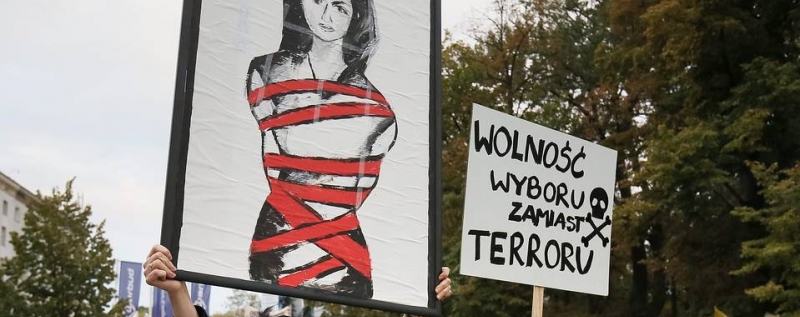Poland: The constitutional crisis undermines human rights
Published on 09 Nov 2016, 10:28 AM

On the 17th and 18th October 2016, the Human Rights Committee reviewed Poland’s seventh report on the implementation of ICCPR. The Polish delegation described the continuous efforts undertaken by the State to enhance the protection of human rights and to fulfill its commitments under the Covenant. Nonetheless, the Committee remains concerned about a number of issues it had raised in the past while new issues have emerged due to recent developments in the State party. In the Constitutional crisis the country is going through, the experts mentioned in their preliminary observations their concern about the budgetary cuts incurred by the Ombudsman, which jeopardise its ability to exercise its mandate.
"Poland’s legal restrictions on access to abortion undermine compliance with ICCPR"
- Human Rights Committee member
Constitutional court
The experts stressed the crucial role of the Constitutional Court, which must remain independent of Parliament and the Executive. Therefore, they expressed their concerns regarding the impact of amendments to the Statute of the Court and noted that worries have arisen as a result of Government initiatives aimed at paralysing the institution. The Committee asked how a Constitutional Court can be effective if the texts that govern it are continuously changed, noting that in addition to the amendments taken over the past year, a new text was now in discussion. In this context, the experts enquired if the Constitutional Court would still be able to perform its functions, while the Government refuses to make public the decisions. The Delegation responded that a law promulgated in 2016 governs the Constitutional Court and this law requires the Prime Minister to publish the decisions of the Court within a certain period. According to the Delegation's replies, so far only two decisions were not published because they dealt with texts that are no longer in force. The Polish Delegation assured that the three powers are independent from each other.
Abortion
Abortion in Poland is legal only in three circumstances: if the life of the mother is threatened, if there is an irreversible deformity or incurable disease of the fetus, and finally, if the pregnancy is the result of a criminal act. Moreover, even women who do meet the very strict requirements for legal abortion are generally not able to access abortion services in practice. This situation increases the rates of clandestine, and potentially unsafe, abortions, and causes women to continue unwanted pregnancies to term against their wish. (see report submitted by a Coaliton of NGOs here). The Commitee reminded that since Poland's last review in 2010, recommendations were made to address this issue. Other treaty bodies, such as CEDAW have done similarly. The Delegation agreed that in some regions it is difficult for women to obtain a legal abortion because of the conscientious objection invoked by doctors. Nevertheless, argued the Delegation, hospitals are obliged to provide access to legal abortion. However, the Delegation said that Parliament has no plans to change the current law on abortion.
Racial discrimination
Another issue of concern for the Committee was the impunity enjoyed by perpetrators of xenophobia attacks. The Committee deplored the lack comprehensiveness of the law on discrimination and asked why the Council for the Prevention of Racial Discrimination, Xenophobia and Related Intolerance was abolished. Regarding hate crimes, the Committee observed that only a small proportion of registered complaints give rise to investigations, prosecutions and sanctions. Also, he wondered whether sufficient efforts were being made to fight against that scourge. He recalled that the Committee on the Elimination of Racial Discrimination requested that the racial nature of a crime should be made an aggravating circumstance. According to the Delegation, the State's anti-discrimination legislation is according to the Council for the Prevention of Racial Discrimination, Xenophobia and Related Intolerance was abolished because it was too theoretical and there were no tangibles benefits from its activities.
Recommendations of the Committee
The Concluding Observations for which the State should provide information on the implementation within one year, concern:
- Constitutional and legal framework within which the Covenant is implemented: The State party should ensure respect for and protection of the integrity and independence of the Constitutional Tribunal and its judges. The Committee urges the State party to immediately publish officially all the judgments of the Tribunal; refrain from introducing measures that obstruct its effective functioning and ensure a transparent and impartial process for the appointment of its members and security of tenure, which meets all requirements of legality under domestic and international law.
- Voluntary termination of pregnancy: The State party should ensure that its legislation does not prompt women to resort to clandestine abortions that put their lives and health at risk. It should further ensure women’s effective access to safe legal abortion throughout the entire country and that women are not obliged, as a consequence of conscientious objection or prolonged review of complaints against refusal to obtain an abortion, to resort to clandestine abortion that put their lives and health at risk as a matter of priority establishing and regulating uniform standardised guidelines in public health for provision of legal abortion services throughout the country; enhancing the effectiveness of the referral mechanism to ensure access to legal abortion in cases of conscientious objection by medical practitioners; and increase education and awareness raising programmes on sexual and reproductive health rights and facilitate effective access to contraceptives.
- Rights of aliens: The State party should refrain from detaining asylum seekers and migrants and implement alternatives, including before deportation; and in those cases where the individual is detained ensure that the detention is reasonable, necessary and proportionate in the light of the circumstances and reassessed as it extends in time; ensure that children are not deprived of liberty except as a measure of last resort and ensure that access to asylum is not obstructed on grounds of religious discrimination.
The next periodic report of Poland should be submitted by 4 November 2021.
Photo credit: Wall Street Journal


